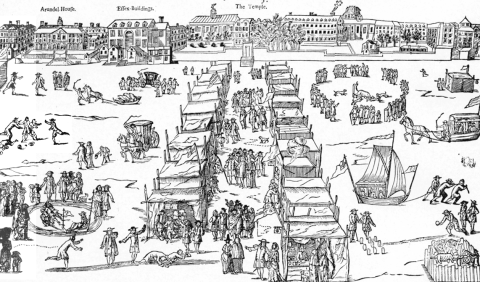
We’re all feeling chilly as Christmas approaches and seeing the almost daily headlines in the national press of about an impending BIG FREEZE. It’s timely then to think about how our early modern ancestors experienced the Christmas and winter season.
For Londoners winter brought a change in the physical environment and urban landscape. Some winters were so cold that the river Thames froze solid meaning those who relied on the water for travel or transporting goods were left looking for alternatives:
Where ships and barges used to frequent, Now may you see a booth or fuddling tent.
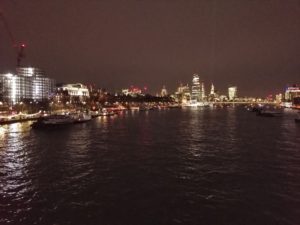
As the couplet suggests, instead of boats on the river, periodically in the bad winters for two hundred years from the winter of 1607-08, people would take to the ice for fun and recreation. Fairs would spring up with markets and refreshments available from stalls and booths. We know a lot of about some of these events from publications which appeared commemorating them. The first of these accounts The Great Frost, Cold Doings in London is in the form of a dialogue between a citizen of London and a man from the country. It describes how people played football, practised archery, ran and slid, and some even wrestled on the frozen waters.
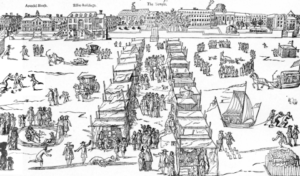
All manner of food and drink was available – often at inflated prices from opportunistic traders – in booths or tents on the ice. In the fuddling tent people could drink as much ale or sweet sack as they had money to buy. A pamphlet which came out after the Frost Fair of 1684 called ‘Great BRITAINS WONDER: OR, LONDONS Admiration’ described how
Early and late, used by young and old, And valu’d not the fierceness of the Cold
It claimed people were having so much fun that they didn’t pay attention to the severe cold. Not everyone was so blasé about the low temperatures. In 1740 The Gentleman’s Magazine advised readers that to avoid frostbite gained on the ice taking hold, when you got home you should ‘chafe the frozen Part well with Snow, keeping from the Fire, till Sensation return’. It noted that this winter was exceptionally severe, with Fleet Street being ‘so clogged with snow and ice’ that ‘Hackney-Coaches’ had to have three or four horses to get through. It described how people would slip and fall in the icy conditions, suffering from fractures and sprains. For sprains, it recommended
Take Comfrey Root beat to a Pulp, half a Pound, Powder of Japan Earth [catechu] 4 Ounces, Spirits of Wine a sufficient Quantity, mix and apply it to the Part.
Of course the severe weather could be fatal. During the 1740 winter fair a poor woman was found frozen to death, with a suckling infant at her breast. Her child was still alive and was saved. More widely people worried about the cold and their health.
Richard Wilkes the Staffordshire physician recorded in his case notes in January 1739 that bad weather in his area had adversely affected people’s health. He lamented that ‘many people took cold, were troubled w[i]th Coughs, Hoarseness, [and] Deafness’. A couple of years earlier he had noted how the cold rainy weather with storms had caused ‘many cases of rot among livestock’, so even when the frost lifted there were still health concerns for people and animals.
Others took the cold into account when submitting to medical treatment. In 1687, Elizabeth Smith went to see Richard Lockyer because she was spitting blood and had a stitch in her side which was bothering her, and he recommended she be let-blood to relieve the pain. Mrs Smith was not prepared to countenance this while there was such a severe frost on the ground. Given the chances of slipping and frostbite, not to mention the effects of being let blood, it is understandable Mrs Smith did not want to traipse to a barber-surgeon to have this treatment.
Sara and Jennifer wish all our readers a Merry Christmas and a Happy and Healthy New Year.
Read more about the severe weather and frost fairs in Sara’s article in the latest edition of the Discover Your Ancestors periodical.

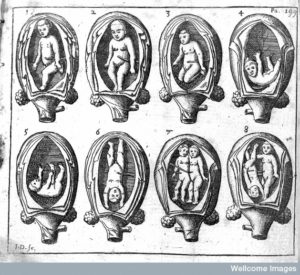
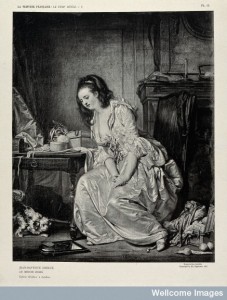
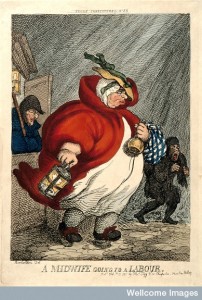

One thought on “Frostbite, Slips and Sprains”
Comments are closed.